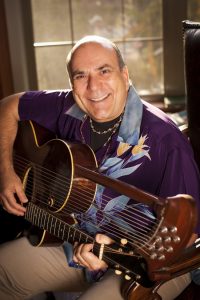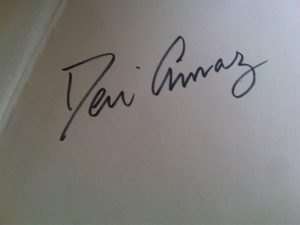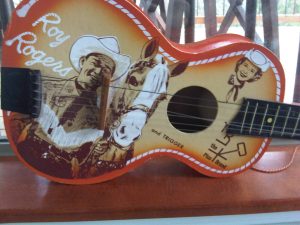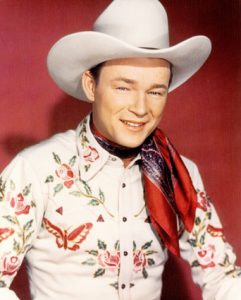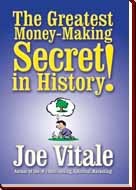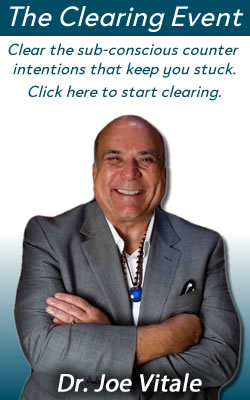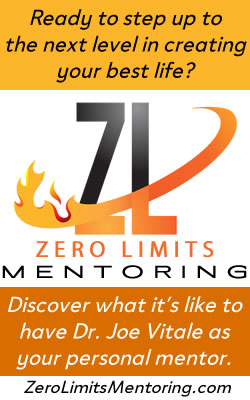Tag: joe vitale
Who Else Is Listening?
People often wonder why the Law of Attraction doesn’t seem to work for them. I’ve addressed topics like counter-intentions many times, which is part of the explanation. (You don’t attract what you consciously think, you attract what you unconsciously think.) But there’s also the issue of how you train your unconscious mind.
Let me explain:
Who’s listening when you say you are going to do something?
When you make an agreement with a friend, who’s listening besides your friend?
When you make an agreement with a company, who’s listening besides the company?
When you make an agreement with yourself, who’s listening besides you?
When you say you are going to do something – no matter how big or small – you best do it. Not only are other people listening, but so is your own unconscious mind. When you don’t keep your word, you communicate that nothing you say can be trusted.
I’m not just talking about legal agreements – though that’s part of the point. I’m talking about any agreement you make. And I’m spelling out that an “agreement” is any time you say you will do something.
Agree to meet for lunch at noon? That’s an agreement.
Agree to turn in the report by Friday at 3? That’s an agreement.
Agree to call a friend over the weekend? That’s an agreement.
So why am I stressing that not keeping these agreements is being heard by somebody other than you and whoever the agreement is with?
Here’s why:
Your own unconscious mind is listening.
When you say you will do something, and you don’t do it, you just taught yourself that you aren’t to be trusted. Or believed.
So the next time you say, “I intend to attract the perfect relationship,” your unconscious mind basically says, “How can I believe you? You didn’t keep your word before.”
As I mentioned above, people often wonder why the Law of Attraction doesn’t seem to work for them all of the time. Part of the answer is in how you trained yourself. When you say you intend to do something, and you don’t, you train your unconscious to distrust anything else you say.
But here’s the good news:
By the same token, when you say you will do something — however great or small — and you do it, you just trained your unconscious mind to trust you.
This is a way to build strength, inner conviction, and high integrity. And the next time you declare an intention or request to the Universe, it will believe you.
When you say you will do something, do it.
After all, you’re not the only one listening.
Ao Akua,
PS — Last year I declared I would create a music CD this year. My first one will be out on May 1st. I’ll be posting an article here soon about it, as well as about other “healing music” that you will love. I played a 1915 Gibson Harp Guitar on one track. (Pictured above) Sarah Marie sang on four of the tracks. Exciting stuff. Stay tuned.
"A Book" Lesson
I just completed reading the 1976 autobiography of Desi Arnaz, the late Cuban-born musician who married Lucille Ball and together created the legendary TV show, I Love You.
I love simple titles. His book is called A Book. It’s a joy to read. Desi was a riveting storyteller. He was smart, talented, persistent, creative, charming, and driven. He and Lucy became the most beloved television couple in history, as well as one of the wealthiest.
But he also went through hell before he ever arrived at success. As with most “overnight” successes, his career took decades to develop into something worth writing about.
What stood out for me in A Book is a lesson Desi learned from his father in Cuba. His father was mayor of Santiago. He was popular and successful. He owned land, businesses, and resort property. His father taught, “There is always a way.”
No matter what the challenge, problem, or circumstance, “There is always a way” to resolve it.
Desi saw this belief in action as a child. When the revolutionaries entered Cuba in the early 1930s, they burned down his family home, destroyed his crops, killed his animals, ran off his mother and family, and put his father in jail.
They went from a life of luxury to being homeless and penniless. They later escaped that country, went to Miami, and started a new life — with nothing at all.
But the belief, “There is always a way” kept them going.
Desi struggled, but kept working; kept taking action.
When opportunities came his way, he took them, even when he didn’t have the skills or experience on hand to pull off the opportunity. He knew he could attract or develop the skills as they were needed.
When asked if he could act, when he had never acted at all, he said, “All my life!” He then learned acting, appearing in several movies and of course later on television.
“There is always a way.”
When he and Lucy found themselves with the opportunity to be involved in a new TV show, they needed to find actors, raise funds, develop new camera methods, use a live audience, build a set, and much more — all firsts at the time with no paths to show what to do, and all with little or no money to make anything happen, and all under a time crunch that would make most people faint — they knew “There is always a way.”
When Lucy was accused of being a communist in the 1950s, Desi put on his fighting gloves and destroyed the rumor. Front-page headlines vindicated the redhead. Desi said the only thing red about Lucy was her hair, and even that was false.
Desi knew, “There is always a way.”
Reading Desi’s book was a real treat. Not only because I always loved him as Ricky Ricardo on I Love Lucy, but also because “There is always a way” is one of my beliefs, too. It’s in my book The Attractor Factor. It’s one of the prime directives in my operating belief system.
You may not know how to do something, but by taking action and moving forward you can find it, create it or invent it.
“There is always a way.”
I recently tweeted a quote from Martin Luther King, Jr. that recaps this lesson from A Book:
“Faith is taking the first step even when you don’t see the whole staircase.” – Martin Luther King, Jr.
You don’t need to have all the answers to begin working toward making your dreams come true.
You don’t need to have all the money to begin working toward making your dreams come true.
You don’t need to have all the experience or education or much of anything else to begin working toward making your dreams come true.
You just need to take action right now — while believing, as Desi proved — “There is always a way.”
Ao Akua,
PS – Right after reading Desi’s book, I read Lucille Ball’s autobiography, published after her death, titled Love, Lucy. Her early life was no party. She, too, struggled. But her persistence, talent, and hard work ultimately paid off. You can learn more principles of attracting what you want through my Miracles Coaching program. Meanwhile, enjoy Desi Arnaz in his prime and try not to smile in this early video of him that breathes the fire of life:
What's "Naturally" You?
A friend listened to the recent interview where Bob Baker* asked me questions about hypnotic marketing for musicians.
During it I plugged my music support team, from Sarah Marie and Mathew Dixon to Guy Monroe and Daniel Barrett. I also plugged my favorite singer, Michelle Malone, and talked about songwriters I love, such as Rob Thomas of Matchbox Twenty. And usually every time I mentioned someone, I gave out their website (just as I did in this very paragraph).
After it my friend said, “You’re a natural promoter.”
I smiled.
For the first few decades of my life, I had no idea what promotion was. I had to learn it. And then I had to make it second nature to me. So today it appears I’m a natural promoter.
But am I?
When I was in college in the early 1970s, broke and unhappy, a friend of mine said “You’re naturally pessimistic.”
Today people often comment, “Joe, you’re naturally optimistic.”
Well, which is it?
Am I naturally pessimistic or naturally optimistic?
What about you?
What are you “naturally” good at?
You have a tendency to lean one way or another in behavior right now based on your past habits. But you can also retrain yourself to lean in another direction with new habits.
- If you’re not happy, you can train yourself to be happy.
- If you’re not a promoter, you can train yourself to be a promoter.
- If you’re not skilled at a talent, you can train yourself to be skilled at it.
With enough training, people will look at you and say, “You’re naturally good at that.”
But we’ll both know the secret.
The secret to being naturally good at anything is focused practice.
Lots of it. I’m practicing the guitar every day. I’m writing songs almost daily. I’m reading books on singing, songwriting, and performing. I’m taking lessons. I’ve got a support team.
At one point soon, people will say, “You’re naturally good on guitar.”
What do you want to be naturally good at?
Get yourself a coach, build a support team, read, study and practice every day, and you, too, can be “naturally” good.
Naturally.
Ao Akua,
PS – * My interview with Bob Baker is at http://bob-baker-podcast.blogspot.com/2011/03/57-joe-vitale-interview-on-hypnotic.html
Decoding Your Childhood
When I was a kid I wanted to play the guitar. I told my parents. They listened and bought me a Roy Rogers cowboy guitar — made out of cardboard.
Being a smart kid, I knew the guitar was a symbol. It meant my parents didn’t believe in me. They never thought I would amount to anything as a guitar player. After all, if they had faith in me and my potential, they’d have bought me a really nice guitar.
I held that memory in my head for almost fifty years.
Fifty years!
That’s a long time to hold a grudge.
When I hooked up with Daniel Barrett, my music producer for my forthcoming album, and told him my sad Roy Rogers guitar story, he suggested I make peace with it.
He suggested I find an old Roy Rogers cardboard guitar and buy it. He thought there might be a lesson in it for me.
I didn’t think so.
But I trust Daniel and did what he asked. I searched, found a nice 1960s Roy Rogers toy guitar on eBay, and bought it.
When it arrived, I felt sick.
When I opened the box, I felt depressed.
There was that damn guitar again.
But I walked off my sadness, sat with the guitar, glanced at it every now and then, played it a little, and relaxed.
I started to remember all the warm fuzzies I had about Roy Rogers, the man, the singer, the actor, the legend.
Who didn’t like Roy Rogers?
He stood for good in the world.
He was the superman of the wild west.
It then occurred to me to get the background story on my parents giving me that guitar. After all, there might be more to what I remembered. So I called my 85-year-old father and asked him about it.
“Dad, do you remember that Roy Rogers guitar you gave me as a kid?”
“You mean that cheapee?” he quickly replied. “I drove to Pennsylvania in a blizzard to get that thing.”
“Why did you get me that particular guitar?”
“We were broke but we wanted to get you what you wanted,” he said. “We got you the best guitar we could afford at the time.”
And there it was.
The truth.
I felt tears well up in my eyes.
My parents did believe in me.
They simply struggled with money. My father was the bread winner in the family. He had an entire platoon of kids to raise. I wanted a guitar. He got me one, doing the best he could at the time.
And for almost fifty years I thought he didn’t believe in me!
My entire story was wrong.
Most likely you have stories from your childhood like this. When we’re too young to know how the world works, we make conclusions that simply aren’t true. (Actually, we do this as adults, too, but that’s a different blog post.)
“When I was a boy of fourteen, my father was so ignorant I could hardly stand to have the old man around. But when I got to be twenty-one, I was astonished by how much he’d learned in seven years.” – Mark Twain
Maybe it’s time to reexamine some of the childhood stories you still carry.
Maybe it’s time to revisit, understand or reinterpret, and forgive.
Maybe it’s time to dig out that Roy Rogers guitar and play a tune.
Pull up a chair…
Ao Akua,
PS – Now that I’ve decoded my childhood, the first song I wrote is a tribute to Roy Rogers. He was a cool guy. And if you’re a guitar collector like me, you might like to know that Roy’s own Martin OM-45 guitar sold for $460,000. You read it right. Almost half a million dollars. Roy bought it for $30 used in 1933 and never knew it was a rare guitar to begin with. It sold for more than Roy’s 1964 Bonneville convertible or his stuffed legendary horse, Trigger. You just never know the value of a guitar — emotionally or otherwise — even if it’s made out of cardboard.
Getting Rich Giving
During my first trip to Warsaw several years ago, a mainstream reporter for a Polish magazine set up an interview with me. I give interviews night and day, in every country I visit, so I was eager to do this one, as well. Especially since I love Poland and its people.
But I wasn’t prepared for how the interview actually went.
The reporter was cute but stern. Her side-kick journalistic photographer was just as serious. In the reporter’s moderate English she asked me hard-nosed questions about the Law of Attraction, Polish people, my books and teachings, and more. No matter what I said, she didn’t like it.
At one point she asked, “Why are you teaching people to become rich?”
It was an interesting question. Under different circumstances it would seem like a silly question. Why not teach people to be rich? What’s wrong with being rich, anyway?
But it was obvious she was coming from a scarcity paradigm. Her mindset was set. My answers didn’t sit well with her. They couldn’t. From her perspective, my paradigm made no sense.
So instead of trying to teach her what an abundance paradigm is in a soundbite, I instead said something like, “I’m not teaching people to get rich, I’m teaching them to be happy.”
The reporter almost reeled back, her body posture suggesting she had just caught me in a grand lie, and she flipped through her notes.
When she found what she wanted, she looked at me and smugly said, “Didn’t you write a book called The Greatest Money-Making Secret in History?”
Now I had her.
“Apparently you haven’t read it,” I said. “When you read that book, you’ll discover that it is about giving away money.”
She stared at me. My answer didn’t compute.
I tried to explain to her about the power of giving; that if you want to attract money now, start giving away money now.
That didn’t sit well with her, either.
Give money when people are broke or jobless?
Give something, I countered. Start somewhere.
She looked confused, even angry.
The entire interview went like that. The resulting article was published as a feature in her Time-like Polish magazine. I have no idea what she actually wrote, as I don’t read Polish. (A Polish friend said, “You don’t want to know.”) It doesn’t really matter. I’m sharing it with you here because of a bigger lesson on giving.
Giving is one of the most powerful principles of all time. You’ve heard about it, from me or others. It’s not new.
But do you actually do it?
If you do give, do you do it in a big way, in a loving and trusting way, and every day?
Be honest.
I used to resist giving, too. If I gave at all, it was a tiny amount. It took me a long time to realize that my not giving, or not giving freely, was sending messages to my mind such as “There isn’t enough,” “I won’t get any more,” “I might need this for an emergency,” “I feel safer with this in my pocket,” and so it goes.
All fear based thoughts.
All self-reinforcing and self-fulfilling prophecies.
Guess what?
The more you hold on to that old limited thinking paradigm, the harder it really is to attract money (or anything else). Your scarcity mindset simply won’t let it in.
What can you do about that?
No B.S. marketer Dan Kennedy once told me the window you receive through is made bigger by the window you give through. Want to receive more? Then give more. It’s that simple.
But beware.
There’s a lot of self-sabotage in this area.
I’ve heard people say, “I joined a multilevel company and they send some of their profits to charities, so I am giving through them.”
No, you’re not.
Giving is when you give direct; when it comes out of your pocket.
I’ve also heard people say, “I can’t afford to give money, so I give time and services gratis.”
That’s a type of giving, but you’re fudging; you have to give money to receive money.
I’ve also heard people say, “I’d give if I knew where to give.”
Baloney. Give wherever you receive spiritual nourishment or inspiration. You know who inspired you today. You can be on the alert for who inspires you tomorrow. Give there.
I’ve also heard, “I feel uneasy giving money. I don’t know what they’ll do with it.”
Who cares what they do with it? Bob Proctor once said, “They can burn the money as far as I care.” Once you give it, it’s no longer yours. Don’t con yourself into thinking you need to control the money once it leaves your hands. Let go. Trust.
When I first started giving money, I felt uncomfortable. I was leaving my comfort zone. I was stretching limiting beliefs until they snapped and shot away. At that point, I started to receive money almost faster than I could give it away.
I then found great joy in giving. I expanded my giving to other things. For example, in just the last few weeks –
- I gave a brand-new music keyboard to a friend.
- I gave a brand-new iPad to another friend.
- I gave away one of my prized guitars.
- I gave away one of my cars. (!)
Some might argue that I can give away cars and more because I’m now wealthy, but that would be overlooking the fact that I got wealthy by giving in the first place.
Think about it.
I got wealthy by giving.
Yes, yes, yes, of course, I’ve done a hundred million other things to get wealthy, from writing and speaking to creating and promoting to being on radio, television and in movies, to following the very steps I reveal in my book, Attract Money Now.
“There are those who give with joy, and that joy is their reward.” – Kahlil Gibran
Giving to get rich is essential to attract success (and that’s why it’s one of the seven key steps in my book, Attract Money Now).
Giving is one of the most heart-expanding and exhilarating feelings.
Giving feels good.
Giving expands your heart and mind.
Giving makes a difference in the world.
Giving widens that inner window to allow you to receive more.
While my Polish reporter in Warsaw may still be writing her articles from her old school scarcity mindset and scratching her head over self-help authors like me who teach people how to “get rich,” you and I know one of the greatest money-attracting and life-enhancing secrets of all time: giving.
And yes, you can get rich giving.
But the only way to find out if this really works is to actually go do it.
Your move.
Ao Akua,
PS – I wrote my little book, the one I mentioned above and told that Polish reporter about, The Greatest Money-Making Secret in History, back in 2003. You can buy it at Amazon but you can read it for free as part of a larger book on giving by Dr. Rick Barrett called Give to Live. Go get it. Then read it. Tell others about it. And then go give something to somebody right now.

